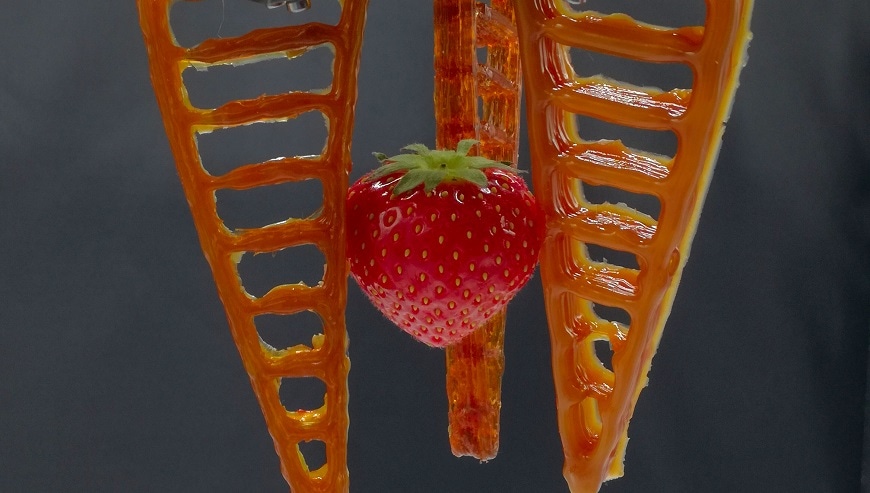Aug 12 2019
A research team from the Vrije Universiteit Brussel, Empa, University of Cambridge, and École Supérieure de Physique et de Chimie Industrielles de la ville de Paris (ESPCI-Paris) will be working together with SupraPolix—the Dutch Polymer manufacturer—to develop state-of-the-art robots: soft robots that “feel pain” and heal on their own.
 A 3D-printed self-healing gripper holding a strawberry. (Image credit: Vrije Universiteit Brussel)
A 3D-printed self-healing gripper holding a strawberry. (Image credit: Vrije Universiteit Brussel)
The study will be conducted over the next three years. The research partners will receive three million Euros from the European Commission for the new project.
In the near future, robots will be found in laboratories and factories and they will also be helping humans in their immediate environment. In addition, robots will assist humans in the household, reducing their workloads and thus making their lives safer.
These machines will work alongside humans but this should be done in a safe manner. In order to ensure people’s safety and facilitate the manipulation of delicate objects with dexterity, many sophisticated robots have been designed from flexible materials.
Since these robots are soft, they cannot hurt people; however, this also means that such “soft robots” are specifically prone to cracks induced by sharp objects that exist around the surroundings. It is usually time-intensive and costly to do the repairs required to get those robots back to work.
Hence to prevent this, the researchers will devise technologies within the latest SHERO project that enable soft robots to heal the damage themselves. To ensure that humans are not involved in this repair process, the researchers are studying self-healing materials that can be used to construct the soft robots. When damaged, these kinds of flexible plastics can fully heal themselves.
An embedded functional material can help in sensing and actuating the self-healing process. The European project is specifically aiming to develop a soft robot built from a self-healing material, which is capable of detecting damage and taking the required steps to (momentarily) heal the defect—provisionally as to finish the ongoing work or more completely at the time of the service operation.
Partners Contribute their Special Know-How to the Project
This prominent project is headed by the University of Brussels (VUB) with a research team from the polymer research lab FYSC and the robotics research center Brubotics.
We are obviously very pleased to be working on the next generation of robots. Over the past few years, we have already taken the first steps in creating self-healing materials for robots. With this research we want to continue and, above all, ensure that robots that are used in our working environment are safer, but also more sustainable. Due to the self-repair mechanism of this new kind of robots, complex, costly repairs may be a thing of the past.
Dr Bram Vanderborght, Professor and Project Manager, Vrije Universiteit Brussel
Thomas George Thuruthel, Research Associate in Soft Robotics Sensing and Self-Healing at the Department of Engineering, University of Cambridge stated, “we will be using machine learning to work on the modelling and integration of these self-healing materials, to include self-healing actuators and sensors, damage detection, localisation and controlled healing. The end goal is to integrate the self-healing sensors and actuators into demonstration platforms in order to perform specific tasks.”
Empa will concentrate on novel flexible actuators and sensors, which can be incorporated into the self-healing polymers.
“In a first step we will embed our piezoresistive soft material sensor fibres in the self-healing polymer to sense continuously the strain and to detect the region where self-healing process has to be activated. In later step other kind of sensor and actuators will be integrated, depending on the final application,” explained Frank Clemens, Group leader at the Laboratory for High Performance Ceramics.
We feel privileged to be a partner in this consortium of Europe’s top research groups on soft robotics. We are convinced that our self-healing materials can bring this field to the next level, thereby creating value for SupraPolix, robotics, and the community at large.
Tonny Bosman, CEO, SupraPolix